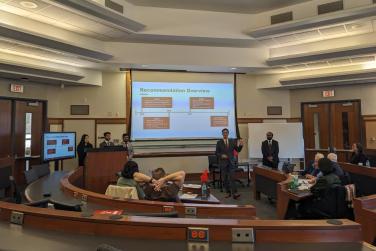
Integration Sessions: An Emphasis on Cross-Functional Learning
One important aspect that attracted me to pursuing a Fisher MBA, as opposed to other MBA programs, is their emphasis and commitment to training MBA candidates in having a cross-functional approach when it comes to problem-solving and dealing with various business decisions. As first-year MBA students, we attend workshops and integration sessions every week that focus on connecting and merging the myriad of complementary disciplines we tackle in our core classes. Two or more core faculty members from different disciplines co-teach a case or conduct an activity to help facilitate and highlight the connections of those complementary core courses. These sessions are held in the afternoon, either once or twice a week.
The photo above is an example of one such session, which was taken from a recent integration class with Prof. Jay Wellman and Prof. David Freel. The session discussed a case study touching on aspects of finance and business ethics. Another example of an integration session we had this semester was in game theory, taught by Prof. Roger Bailey and Prof. Stephanie Wapner. The session highlighted not only game theory in economics but also organizational behavior and how it relates to incentives within a company.
In some of our integration sessions, we have also had various guest speakers and panelists that talked about diverse topics. One of my favorite sessions was a panel of alumni from various companies (Nationwide, J.P. Morgan Chase, and Accenture Strategy, just to name a few). They talked about their experiences in cross-departmental problem solving, especially during the pandemic. The panelists touched upon areas of leadership and organizational behavior that are important for future managers and department leaders.
Overall, the integration sessions are just another way for Fisher to foster “real-world” cross-functional learning within its community. Oftentimes, we tend to think that there is only one single best solution to a particular problem; however, Fisher embraces the complexity of business and emphasizes the importance of combining our various experiences and expertise to properly evaluate a problem and manage proper decisions.







